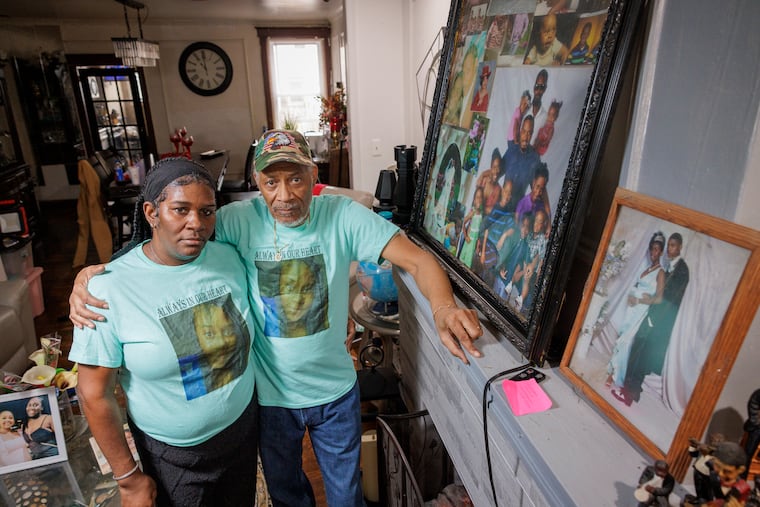A mother of four got killed. It should have been big news.
If Kasheeda Jones had been white, and driving a minivan, her death could be national — or even international — news. But in Philly, it was just another Friday night.

Kasheeda Jones’ life revolved around her close-knit family.
A 2004 honors graduate of University City High School, she briefly attended Cheyney University, hoping to become a TV weather personality, but left for financial reasons. Eventually, she became a corrections officer like her mother and worked in the prison system for 15 years. Along the way, she had four daughters — now ages 15, 12, 6, and 3 — and purchased a three-bedroom rowhouse on Gilbert Street in East Mount Airy.
She dreamed of relocating someday to Atlanta.
In a lot of ways, her life was like that of other parents working hard to raise their family — until Nov. 17.
Her car wasn’t running well, so she came by her parents’ comfy three-bedroom house on Ogontz Avenue that morning to borrow their car. After dropping the kids off, she came back, and her dad decided to rent a car while hers was being repaired. “I stayed there until she got the car,” Kenneth Jones, 70, told me. “She said, ‘OK, Dad, I’m all right,’ and that was the last time I saw my daughter.”
Later that day, the phone rang.
Kasheeda Jones was shot that night on the 800 block of West Venango and transported by a private vehicle to Temple University Hospital, where she died. No arrests have been made, and police have no suspects.
I bet most people reading this right now didn’t hear about Jones’ death.
What happened to her went largely unnoticed outside of her wide circle of family and friends. News coverage of her killing was cursory — a couple of brief mentions in local outlets, nothing more.
A mother of four was killed, and most of us just moved on.
I get that she was just one out of 410 people killed in Philadelphia last year, and at a certain point, the names and numbers start to run together. But Jones’ life mattered.
It mattered to the four young daughters she left behind.
It mattered to her grieving parents, Bani and Kenneth.
It mattered to the former work colleagues in the corrections system and elsewhere who thought so highly of her.
It mattered to her neighbors in East Mount Airy.
It matters, also, that if Jones had been white, and driving a minivan, her death could be national — or even international — news. But in Philly, it was just another Friday night.
Her parents had been looking forward to their annual pre-Thanksgiving gathering that Sunday. It was their long-established tradition to have a big dinner the Sunday before the holiday, so people could spend Thanksgiving itself with others. It was an exciting time for the couple, who’d been married 40 years. They had both just gotten their first passports and were looking forward to traveling with Kasheeda to Jamaica to celebrate her birthday on Dec. 5.
“I feel like more should be done,” Bani Ferguson Jones, 57, Kasheeda’s mother, told me. “My daughter dedicated half of her life to law enforcement. Is this the thanks she gets? The type of work she did was with criminals. And then she got killed by a criminal.”
She added, “They’re just not doing enough to expose this.”
Chad Dion Lassiter, executive director of the Pennsylvania Human Relations Commission, agreed. “A mother of four was snuffed out because of gun violence and we didn’t tell the story,” he told me.
As a Black journalist, I’ve heard the complaint many times: that the media don’t cover the deaths of people of color with the same ferocity as they cover the deaths of white people. Many African Americans have a negative view of the media, according to a study released by the Pew Research Center. Unequal coverage is one of the reasons.
Thankfully, some Black journalists are trying to change that. Recently, members of the newly formed Philadelphia chapter of the National Association of Black Journalists met at The Inquirer to discuss the Pew findings and what can be done about them. It was hard to hear because many of us have devoted our entire careers to helping our newsrooms do a better job covering African Americans. Things have gotten better, but so much still needs to be done — not that Black people expect much to change anytime soon. Nothing was resolved that night, besides renewing our commitment to helping the industry right itself.
As I sat in that meeting, I couldn’t help but think of Kasheeda Jones and her family.
Her daughters have moved in with their grandparents, who have done their best to modify their home to make room for four children, including transforming “Pop Pop’s” basement “man cave” into a TV room. A spare room that had been set up as a walk-in closet and hair and makeup space for Bani is now an extra bedroom for two of the sisters.
The oldest girl turns 16 in May and wants to go to Florida for an upcoming cheerleading competition. The youngest loves dressing up in costumes and has a birthday coming up on March 5. Her grandparents hope to be able to throw her a princess party. There are also dance classes and a lot of other extras.
The Joneses will do what they can to continue what their daughter started. But, of course, nothing will ever be the same.
“She left four girls that she’s never going to get a chance to see graduate high school, get married, have babies,” Bani said. “And they’re not going to have their mommy. They’re walking around, and they don’t have their mother anymore.”